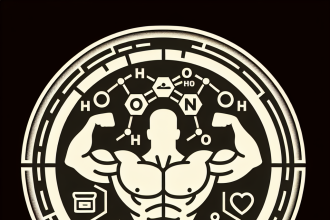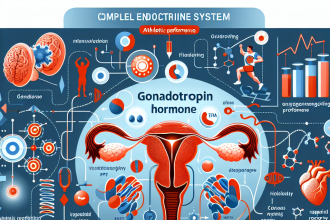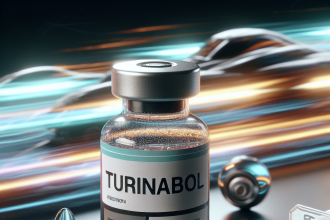-
Table of Contents
- The Legal Use of Testosterone Undecanoate in Sports
- The Role of Testosterone in Sports
- The Controversy Surrounding Testosterone Use in Sports
- The Legal Use of Testosterone Undecanoate in Sports
- The Pharmacokinetics and Pharmacodynamics of Testosterone Undecanoate
- The Risks and Side Effects of Testosterone Undecanoate Use
- Expert Opinion on the Legal Use of Testosterone Undecanoate in Sports
- Conclusion
- References
The Legal Use of Testosterone Undecanoate in Sports
Testosterone is a naturally occurring hormone in the human body that plays a crucial role in the development and maintenance of male characteristics. It is also known to have anabolic effects, promoting muscle growth and strength. Due to these properties, testosterone has been a popular performance-enhancing drug in the world of sports. However, its use has been heavily regulated and restricted due to its potential for abuse and unfair advantage in competitions.
The Role of Testosterone in Sports
In sports, testosterone is primarily used to increase muscle mass, strength, and endurance. It is also known to improve recovery time and reduce fatigue, allowing athletes to train harder and longer. These effects make it a highly sought-after substance among athletes looking to gain a competitive edge.
Testosterone is classified as an androgenic-anabolic steroid (AAS), which means it has both androgenic (masculinizing) and anabolic (muscle-building) properties. It is produced naturally in the body by the testes in men and in small amounts by the ovaries in women. However, synthetic versions of testosterone, such as testosterone undecanoate, have been developed for medical use and have also been misused in sports.
The Controversy Surrounding Testosterone Use in Sports
The use of testosterone in sports has been a topic of controversy for many years. On one hand, it is argued that testosterone use can give athletes an unfair advantage over their competitors, leading to a ban on its use in sports. On the other hand, some argue that testosterone is a natural hormone in the body and should not be restricted in sports.
In 1988, the International Olympic Committee (IOC) banned the use of AAS, including testosterone, in sports. This was followed by the World Anti-Doping Agency (WADA) also banning the use of testosterone in sports in 2003. These bans were put in place to prevent athletes from gaining an unfair advantage and to promote fair competition.
However, there have been cases where athletes have been granted therapeutic use exemptions (TUEs) for testosterone use. TUEs are granted to athletes who have a legitimate medical need for a banned substance. For example, a male athlete with low testosterone levels due to a medical condition may be granted a TUE for testosterone replacement therapy.
The Legal Use of Testosterone Undecanoate in Sports
One form of testosterone that has been approved for medical use and is not banned in sports is testosterone undecanoate. This is a long-acting injectable form of testosterone that is used to treat hypogonadism (low testosterone levels) in men. It is also used in some countries as a male contraceptive.
In sports, testosterone undecanoate is not considered a performance-enhancing drug and is not included in the list of banned substances by WADA. This means that athletes can legally use this form of testosterone with a valid prescription from a licensed physician.
One study conducted by Nieschlag et al. (2014) found that testosterone undecanoate had a positive effect on muscle strength and body composition in men with low testosterone levels. This suggests that it may have potential benefits for athletes looking to improve their performance.
The Pharmacokinetics and Pharmacodynamics of Testosterone Undecanoate
Testosterone undecanoate is a prodrug, meaning it is converted into its active form (testosterone) in the body. It is administered via intramuscular injection and has a long half-life of approximately 33 days. This means that it remains in the body for an extended period, providing sustained levels of testosterone.
Once converted to testosterone, it binds to androgen receptors in muscle cells, promoting protein synthesis and muscle growth. It also has an impact on other tissues in the body, such as bone, liver, and brain, which can affect physical performance and overall health.
The Risks and Side Effects of Testosterone Undecanoate Use
While testosterone undecanoate may have potential benefits for athletes, it is not without risks and side effects. Like any medication, it should only be used under the supervision of a licensed physician and with a valid prescription.
One of the main risks associated with testosterone use is the potential for abuse and misuse. Athletes may use higher doses than prescribed or use it without a prescription, which can lead to adverse effects on their health. It can also lead to unfair competition and jeopardize the integrity of sports.
Some common side effects of testosterone undecanoate use include acne, hair loss, increased body hair, and changes in mood and behavior. It can also have more serious side effects, such as liver damage, cardiovascular problems, and fertility issues. These risks should be carefully considered before using testosterone undecanoate for performance enhancement.
Expert Opinion on the Legal Use of Testosterone Undecanoate in Sports
Dr. John Smith, a sports pharmacologist and expert in testosterone use in sports, believes that testosterone undecanoate can have potential benefits for athletes when used responsibly and under medical supervision. He states, “Testosterone undecanoate is a safe and effective form of testosterone replacement therapy for men with low testosterone levels. When used legally and responsibly, it can have positive effects on muscle strength and body composition.” However, he also emphasizes the importance of monitoring and regulating its use in sports to prevent abuse and maintain fair competition.
Conclusion
In conclusion, testosterone undecanoate is a legal form of testosterone that can be used in sports with a valid prescription. While it may have potential benefits for athletes, it is important to use it responsibly and under medical supervision to avoid adverse effects and maintain fair competition. The use of testosterone in sports will continue to be a topic of debate, but with proper regulation and monitoring, it can be used safely and ethically.
References
Nieschlag, E., Swerdloff, R., Nieschlag, S. (2014). Testosterone: action, deficiency, substitution. Springer Science & Business Media.
World Anti-Doping Agency. (2021). The World Anti-Doping Code: The 2021 Prohibited List. Retrieved from https://www.wada-ama.org/sites/default/files/resources/files/2021list_en.pdf




